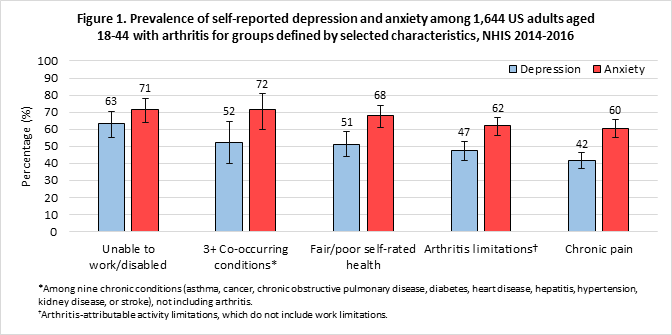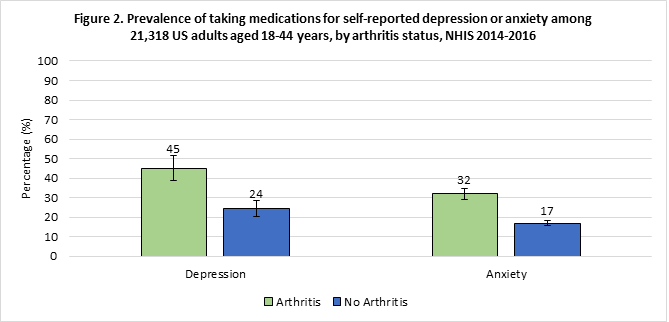Session Information
Date: Monday, October 22, 2018
Title: 4M117 ARHP Abstract: Pain, Anxiety, & Depression–ARHP I (1946–1951)
Session Type: ARHP Concurrent Abstract Session
Session Time: 4:30PM-6:00PM
Background/Purpose: Depression and anxiety are frequent comorbid conditions among adults with arthritis, and are associated with poorer quality of life, reduced adherence and efficacy of arthritis treatment, and suicidal ideation. In the general population, younger adults have a higher prevalence of depression and anxiety than older adults. We analyzed nationally-representative population-based prevalence of self-reported depression and anxiety among 21,318 young adults (aged 18-44 years) with and without arthritis.
Methods: We combined National Health Interview Survey data from 2014, 2015, and 2016. Arthritis was “yes” to: “Have you ever been told by a doctor or other health care professional that you have arthritis, rheumatoid arthritis, gout, lupus, or fibromyalgia?” We classified respondents as having self-reported depression and/or anxiety if they had high or medium frequency (daily, weekly, or monthly) of respective symptoms. Analyses accounted for the complex survey design to make estimates representative of the US civilian, non-institutionalized population. We estimated the unadjusted weighted prevalence (%) with 95% confidence intervals (CI) of depression and anxiety by arthritis and groups defined by selected characteristics.
Results: In 2014-2016, 7.7% of young adults reported arthritis and among them, 29.0% and 48.7% reported depression and anxiety, respectively. Depression prevalence was 2.4 times higher for young adults with arthritis than those without (29.0%; CI=26.0-32.2 vs. 12.3%; CI=11.7-13.0); anxiety prevalence was 1.6 times higher (48.7%; CI=45.5-52.0 vs. 29.6%; CI=28.6-30.6). Among 1,644 young adults with arthritis, depression prevalence was high among those unable to work/disabled and anxiety prevalence was high among those unable to work/disabled and those with 3+ co-occurring chronic conditions (Figure 1). Among those with arthritis and the respective conditions, 32.1% (CI=28.1-36.4) reported taking medications for anxiety and 45.0% (CI=38.7%-51.5%) reported taking medications for depression; for both, medication use was higher compared to those without arthritis (Figure 2).
Conclusion: Self-reported depression and anxiety are common in young adults and considerably more prevalent among those with arthritis than those without. Although there is substantial awareness of depression in adults with arthritis, anxiety prevalence was higher. Health care providers can help arthritis patients by screening for these conditions, especially in younger adults, and referring them to mental health specialists for diagnosis and treatment.
To cite this abstract in AMA style:
Guglielmo D, Hootman JM, Murphy L, Boring M, Theis K, Helmick CG, Barbour KE, Katz P. Self-Reported Depression and Anxiety Among US Adults Aged 18-44 Years with Arthritis, National Health Interview Survey 2014-2016 [abstract]. Arthritis Rheumatol. 2018; 70 (suppl 9). https://acrabstracts.org/abstract/self-reported-depression-and-anxiety-among-us-adults-aged-18-44-years-with-arthritis-national-health-interview-survey-2014-2016/. Accessed .« Back to 2018 ACR/ARHP Annual Meeting
ACR Meeting Abstracts - https://acrabstracts.org/abstract/self-reported-depression-and-anxiety-among-us-adults-aged-18-44-years-with-arthritis-national-health-interview-survey-2014-2016/


